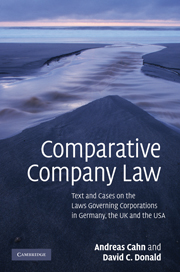 Comparative Company Law
Comparative Company Law Book contents
- Frontmatter
- Contents
- List of figures
- List of tables
- Preface and acknowledgments
- Glossary
- List of abbreviations
- Table of cases
- Table of legislation
- PART I The essential qualities of the corporation
- PART II The corporation and its capital
- PART III Governing the corporation
- SUBPART A The management
- SUBPART B The members
- 16 Shareholder voting rights
- 17 Shareholder information rights
- 18 Shareholder meetings
- 19 Shareholder duties
- 20 Judicial enforcement of shareholder rights
- PART IV Corporate combinations, groups and takeovers
- References
- Index
20 - Judicial enforcement of shareholder rights
from SUBPART B - The members
- Frontmatter
- Contents
- List of figures
- List of tables
- Preface and acknowledgments
- Glossary
- List of abbreviations
- Table of cases
- Table of legislation
- PART I The essential qualities of the corporation
- PART II The corporation and its capital
- PART III Governing the corporation
- SUBPART A The management
- SUBPART B The members
- 16 Shareholder voting rights
- 17 Shareholder information rights
- 18 Shareholder meetings
- 19 Shareholder duties
- 20 Judicial enforcement of shareholder rights
- PART IV Corporate combinations, groups and takeovers
- References
- Index
Summary
Required reading
D: AktG, §§ 147, 148, 241–248
UK: CA 2006, Part 11
US: DGCL, §§ 325–327; New York Business Corporations Law, § 627; ALI Principles §§ 7.01–7.12
Judicial remedies and the stock corporation
The goals and the difficulties of shareholder suits
Many of the preceding chapters have discussed various types of shareholder rights. We have examined the rights of shareholders to receive a portion of the company's income in the form of dividends, the manner in which shares can be separated into various classes with attendant rights, and the right of all shareholders to have their management act loyally and manage the company with due care. Minority shareholders also have a right that majority shareholders act loyally and not use their voting power to damage the company or unfairly prejudice the minority. Chapters 16 and 18 explained the types of matters on which shareholders can vote and the way voting rights are exercised. Chapter 17 briefly delved into the rights to information that allow shareholders to make informed decisions in exercising their other rights. As these rights all coexist in the hybrid property interest constituted by a share of stock, they are designed to work in a complementary fashion that is tailored to the needs of a shareholder as co-owner of the company. For example, if through a legally required regular disclosure shareholders were to receive information indicating that management could have acted improperly, and they confirmed this through a specific request for more information, the shareholders could then use their voting rights to remove the director from office.
- Type
- Chapter
- Information
- Comparative Company LawText and Cases on the Laws Governing Corporations in Germany, the UK and the USA, pp. 599 - 618Publisher: Cambridge University PressPrint publication year: 2010


